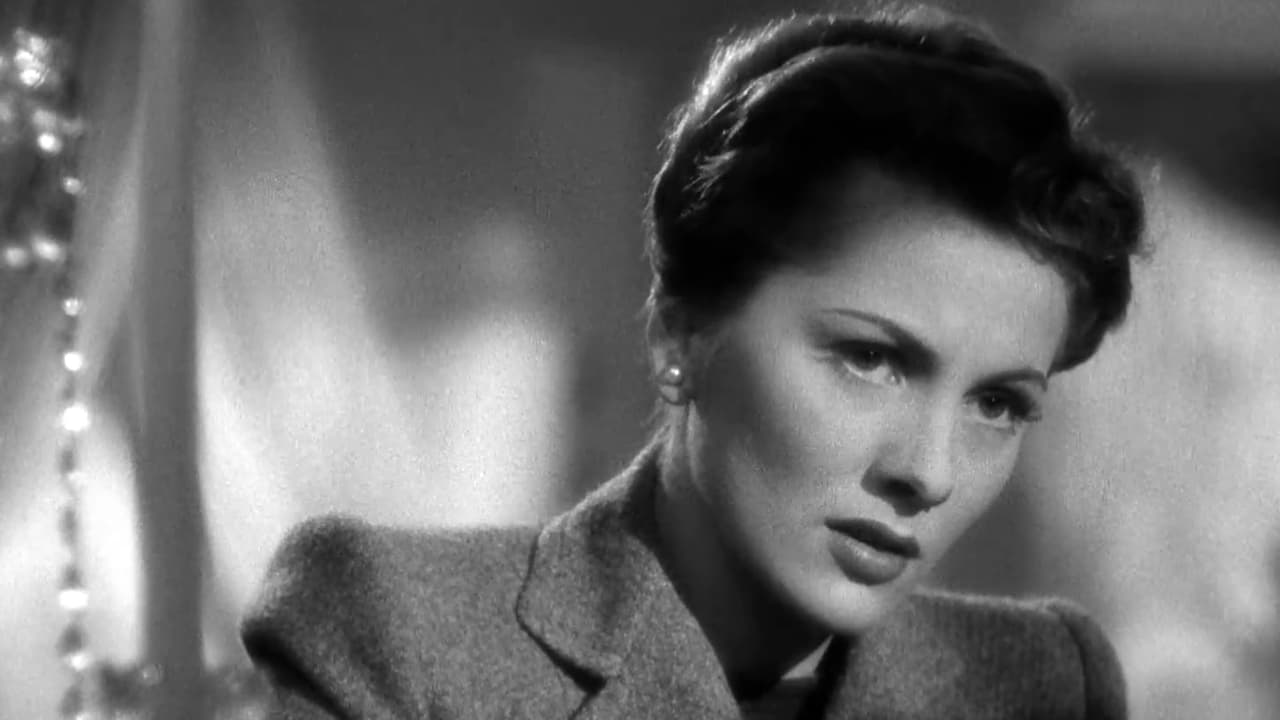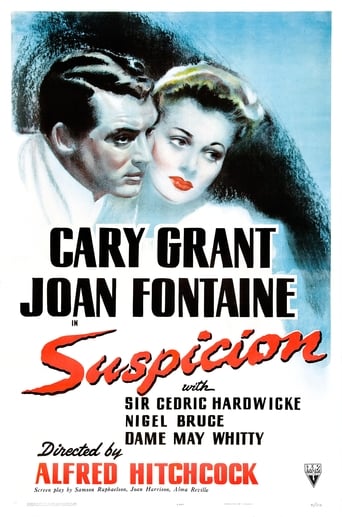

Dismissed by critics as "minor" Hitchcock, SUSPICION nonetheless has plenty to recommend it.Set in a chocolate-box English village reconstructed on the RKO back-lot, full of green fields, mock-Tudor housing, hunting scenes and over-stuffed interiors, the film contrasts the stultifying respectability of spinster Lina's (Joan Fontaine's) life with the prospects offered by chancer Johnnie (Cary Grant).Lina lives in a village world where church-going and hunt balls are the highlights of daily life. Her parents (Dame May Witty and Sir Cedric Hardwicke) spend their days in their comfortable living-room, either embroidering or reading the paper. They have no need for excitement: General McLaidlaw (Hardwicke) has enjoyed a distinguished military career and has now retired. By contrast Johnnie, although reluctant to work, as well as being a habitual liar with a penchant for betting, has that indefinable quality called charm (what else would he be, when played by Grant?) Lina understands what a worthless person he is, but cannot detach herself from him. As Johnnie's friend Beaky (Nigel Bruce) tell her, he can be excused anything.The only suggestion that something might be amiss is communicated through lighting. The two protagonists are perpetually photographed with bars - window-bars, blinds, stairwells being three example - either across their bodies or at the back of the frame, suggesting imprisonment. This is both physical as well as emotional: neither Johnnie nor Lina can be honest with one another. As a result Lina continually suspects her husband's motives.There are continual echoes of REBECCA, filmed in the previous year - not only with the presence of Fontaine in the case, but also with the use of stock footage taken on the coast from the cliffs looking down at the sea crashing below. The final sequence, where Johnnie drives his sports car at breakneck speed, putting both his own and his spouse's safety at risk, recalls a similar moment in the earlier film. The endings of the two films are different, but the intertexts remain.There is one memorable sequence towards the film's end, drawing attention to Hitchcock's penchant for the macabre. As Johnnie is abound to climb the stairs, he is photographed in shadow, picked out against a tight column of bright light. Just what his motives are, we know not; but the visual effect is stunning.
... View MoreThe mood at the beginning of this Alfred Hitchcock classic is rather playful and humorous but as its story develops the atmosphere becomes more and more tense. The subtle way in which this change happens is very impressive and just one of the reasons why this psychological thriller becomes so gripping. Based on Francis Iles' novel "Before The Fact", it recounts a series of incidents that lead a newly married woman into suspecting that her husband could be planning to murder her. Is she really in mortal danger or is she just neurotic? Dowdy,bespectacled, Lina McLaidlaw (Joan Fontaine) meets the debonair Johnnie Aysgarth (Cary Grant) on a train and helps him out of an awkward situation when the ticket collector points out that Johnnie's in a first-class compartment and only has a third-class ticket. Lina's also intrigued when she notices his photograph in the society magazine that she's reading. A little time later, Johnnie goes to the English village where Lina lives and engineers a meeting with her. He's very persuasive and charming and very soon they elope together. After a wonderful but extremely expensive European honeymoon, they return to their large country house to start their new life together.Lina's shocked when Johnnie admits that he's absolutely penniless and persuades him to take a position he'd recently been offered at his cousin's estates office. Shortly after Johnnie begins his employment with Captain Melbeck (Leo G Carroll), his best friend "Beaky" Thwaite (Nigel Bruce) comes to stay. The very jovial but tactless Beaky tells Lina that he'd seen Johnnie at the racetrack in the previous week and later when she discovers that her new husband has sold the two antique chairs that they'd been given as a wedding present by her parents, she presumes he'd done so to pay off his gambling debts. Lina soon realises that Johnnie is a compulsive liar and subsequently discovers that he'd been fired from his job because he'd embezzled £2,000 from the firm. Melbeck tells Lina that he'd given Johnnie time to pay back the money to avoid having to prosecute him.Shortly after, Johnnie tells Lina that he's planning to embark on a large real estate development and that Beaky has agreed to invest a substantial sum of money in the project. His naïve friend trusts him implicitly but Lina is convinced that Johnnie will simply use his friend's money to pay off Melbeck and so discourages Beaky from continuing with their plans. Johnnie gets angry about this and abandons the whole project. Beaky then decides to go to Paris and at his invitation; Johnnie agrees to go on part of the journey with him. When Lina is informed by the police that Beaky died suddenly in mysterious circumstances in Paris and Johnnie tells more lies about his whereabouts at the time, she suspects he may have killed his friend. Then when she discovers that he'd also made some enquiries about the possibility of raising money on her life insurance policy, Lina starts to fear that he's also planning to murder her.In "Suspicion", the audience is taken on a suspense-packed journey that leads to a denouement which arrives very unexpectedly and provides a complete anti-climax. Fortunately, the journey is so good in this case that the ending (which had to be modified to meet the requirements of the studio and the Production Code) doesn't detract too badly from the enjoyment of watching this movie. Cary Grant is superb as he makes his character's unusual mixture of charm, wit and ambiguity come to life so convincingly and Joan Fontaine, in her wonderful Oscar-winning performance, makes Lina's vulnerability, shyness and anxiety very real.
... View MoreIn "Suspicion", Hitchcock takes the audience on a ride. The story starts by mixing two seemingly incompatible people--Cary Grant as Johnnie and Joan Fontaine as Lina--and making them a couple. She is a studious, introspective, conservative woman and he is an impetuous, impertinent, immature extrovert. Their joining is the recipe for some kind of discord.Lina is the viewer's avatar in the film. Notice how the story follows her point of view. Much of the circumstantial evidence that points to Johnnie's guilt is viewed through her eyes, conveyed through her external clues to inner turmoil in a great performance by Fontaine. Note the way Hitchcock lights the interior of their home--usually with a multitude of shadows. He frames Lina with the shadows of the large window, a cage, making her a prisoner of her own love for Johnnie.The dream of happiness that was the center of their honeymoon becomes a nightmarish roller coaster ride of emotions as soon as they return home. Lina is an amateur regarding relationships, so it takes her a while to understand her feelings and to learn what limits her fidelity has.As the evidence--circumstantial and otherwise--piles up (perhaps a little too neatly), Hitchcock asks the viewer to understand Lina's confusion and her ambivalence. But it is human nature to want to exhaust every last shred of doubt in defending one's love, so we take the journey with Lina until finally there is only certainty. The script is very tight and cleverly written and the score is lush, accenting the emotional highs.Hitchcock wanted a darker ending, but still managed to create an ending that delights in having taken the audience for a ride. He would get his darker ending two years later, with "Shadow of a Doubt". In both cases, note how he uses a waltz theme for the one under suspicion.I thoroughly enjoyed this film. It is filled with prototypical Hitchcockian elements (e.g. his focus on her hair). Joan Fontaine's performance alone--so nuanced, especially when compared to some other portrayals of women spiraling toward a breakdown--makes the film worth watching.
... View MoreAlfred Hitchcock's Suspicion is a movie with a great suspenseful mood where Lina Auysgarth (Joan Fontaine) suspects that her husband John (Cary Grant)suspects that he is going to kill her. Though I really liked the story, acting, writing, and directing. My 2 biggest gripes with this movie is a small part of the story which is that Fontaine's character suspects that Grant's character is going to kill him when she visualized him killing Mr. Thwaite she just faints and just jumps to the conclusion that she may be the next target when she isn't. The ending just isn't an original Hitchcock ending because Grant and Fontaine end up happily ever after (really not like other Hitchcock movies). But in the end it is a well done movie with equally wonderful work from the cast and crew to this movie.On average 9.8/10= 98%
... View More